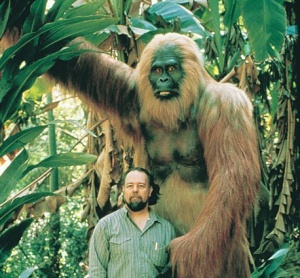Difference between revisions of "(Analyst) Bill Munns"
(Created page with "thumb|Bill Munns Bill Munns was first connected to the Bigfoot discussion by virtue of his well publicized full scale reconstructed figure of Gig...") |
m (Darkwing moved page Bill Munns to (Analyst) Bill Munns without leaving a redirect) |
(No difference)
| |
Revision as of 18:07, 9 September 2022
Bill Munns was first connected to the Bigfoot discussion by virtue of his well publicized full scale reconstructed figure of Gigantopithecus (with him standing beside it), originally published in the book "Other Origins", and subsequently digitized and freely copied into Bigfoot websites and Forums whenever the discussion turned to Gigantopithecus and its potential relationship to the Sasquatch. Bill has worked as a special effects/prosthetics makeup artist since 1969, starting at Universal Studios, under Mike Westmore. During his career, he has made numerous full body suits, fur costumes, masks, and animatronics for various movies, TV shows, and commercials. Based on that experience, in 2008, he began a series of postings on BFF on "Creature Suit Analysis", with both general information about making creature type suits or costumes for films, and specific references to the ongoing controversy of the Patterson-Gimlin Film, and the debate as to whether what is seen in the film is a real creature or a hoaxed event with a person in a fur suit.
Information about his career making "creatures" for films, museums, and wildlife art, including some behind the scenes photos and description of the Gigantopithecus model, can be found at the Creature Gallery website (www.billmunnscreaturegallery.com).
His analysis of the Patterson-Gimlin Film, and its subject figure, has continued and expanded its scope beyond the issue of costume and makeup effects technology. He devised a portable custom high resolution film scanning system, enabling him to scan one of John Green's film copies on Feb. 1, 2009 at John's home town in Canada, to scan segments from Bob Gimlin's personal film copy in Yakima WA on May 16, 2009, and to scan Patricia Patterson's contact printed full frame Archival Copy of the film at her home in Yakima, WA on June 25, 2009. These scans are part of a film genealogy analysis Bill has undertaken, which, on completion, will hopefully clear up some issues for film copy history, as well as rectify discrepancies in frame count and resolve film artifact issues that have distracted from the subject image analysis. Already, this effort has both confirmed (by camera identification marks imprinted on a film by the camera aperture gate shape) that the Kodak K-100 camera is unquestionably the camera used for the PG Film, and confirmed the true full frame image size, a necessary first step to a photogrammetry analysis of the film, and use of optical formulas to calculate the size of objects seen in the film.
One particularly controversial aspect of his research is "The Munns Report", his analysis and website supporting same (www.themunnsreport.com ) which is currently his principle venue for releasing news and progress on his film research. Of particular controversy is his suggestion that the camera used to film the PGF had a 15mm lens on it instead of the long presumed standard 25mm lens the camera apparently had when it was rented months before the Bluff Creek encounter in October 1967. This aspect of the Report remains a highly contentious issue, and analysis to reach a final determination is ongoing.
There is a common misconception that Bill is doing "Bigfoot Research" or is a "believer". He is doing research on the Patterson-Gimlin Film only, and evaluating the data it contains, to see what determinations can be made about both the physical film itself, and the subject seen in the film image. And he is mystified by the Bigfoot-Sasquatch phenomenon, open to the prospect of its existence, willing to listen, supportive of many current research efforts and researchers, but he does not currently endorse any research conclusions based on other photos, sightings, footprints or related evidence material.
His opinion of the Patterson-Gimlin Film is that the subject seen in the film is something real, and not a hoaxed event with a human in a costume.
